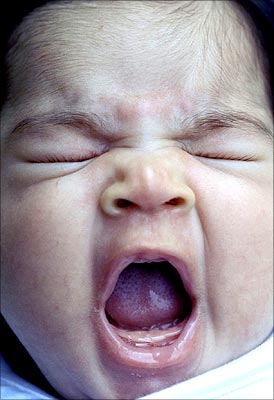
Lack of sleep can age your skin faster.
Sleep-deprived people show signs of premature skin ageing and a decrease in their skin's ability to recover after exposure to sun, a new study has found.
In a first-of-its-kind clinical trial, scientists at University Hospitals (UH) CaseMedicalCenter in US found that sleep quality impacts skin function and ageing.
The trial demonstrated that poor sleepers had increased signs of skin ageing and slower recovery from a variety of environmental stressors, such as disruption of the skin barrier or ultraviolet radiation. Poor sleepers also had worse assessment of their own skin and facial appearance.
"Our study is the first to conclusively demonstrate that inadequate sleep is correlated with reduced skin health and accelerates skin ageing. Sleep deprived women show signs of premature skin ageing and a decrease in their skin's ability to recover after sun exposure," said Dr Elma Baron, primary investigator of the study.
The study involved 60 pre-menopausal women between the ages of 30 and 49, with half of participants falling into the poor quality sleep category.
The study involved a visual skin evaluation and participation in several non-invasive skin challenge tests including UV light exposure and skin barrier disruption.
Additionally, participants filled out a sleep log for one week to quantify sleep duration.
The researchers found statistically significant differences between good and poor quality sleepers.
Using a skin ageing scoring system, poor quality sleepers showed increased signs of intrinsic skin ageing including fine lines, uneven pigmentation and slackening of skin and reduced elasticity.
In this system, a higher score means a more aged appearance. The average score in the good quality sleepers was 2.2 versus 4.4 in poor quality sleepers. They found no significant difference between the groups in signs of extrinsic ageing, which are attributed primarily to sun exposure, such as coarse wrinkles and sunburn freckles.
Researchers found that good quality sleepers recovered more efficiently from stressors to the skin. Recovery from sunburn was more sluggish in poor quality sleepers, with erythema (redness) remaining higher over 72 hours, indicating that inflammation is less efficiently resolved.
A Transepidermal Water Loss (TEWL) test was used at various time points to determine the ability of the skin to serve as an effective barrier against moisture loss.
In measurements 72 hours after a skin barrier stressor (tape-stripping), the recovery of good quality sleepers was 30 per cent higher than poor quality sleepers (14 per cent vs 6 per cent) demonstrating that they repair the damage more quickly, researchers said.
Self perception of attractiveness was significantly better in good quality sleepers (mean score of 21 on self evaluation) vs poor quality sleepers (mean score of 18).